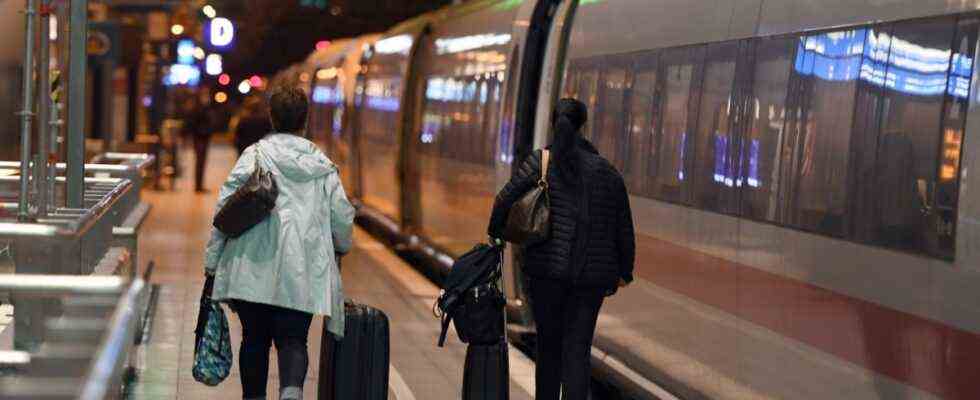Despite a new offer from Deutsche Bahn, the third strike round of the German Train Drivers Union (GDL) in passenger transport has been running since early Thursday morning. The labor dispute started as planned at 2 a.m., the union’s strike leadership announced on request. The labor dispute in the Group’s freight transport had already started on Wednesday afternoon. The head of the train drivers’ union GDL, Claus Weselsky, has rejected the new tariff offer of the railway as unacceptable and announced a continuation of the current strike.
The offer of the management was “not acceptable in terms of content,” said Weselsky on Thursday in the ARD. He accused the web guide of being “Janus-faced”. This attitude has become evident with the new offer. The actual goal of management is to get rid of the GDL. From Weselsky’s point of view, the group demands that the scope of the collective agreement be restricted so that it does not apply to new members. “The aim of the railway board is to destroy the existence of the GDL,” said Weselsky. The offer is also not acceptable because it includes a zero round for this year. Weselsky added that the union would “of course” continue to negotiate with Deutsche Bahn.
Until probably Tuesday morning, rail customers will have to be prepared for severe restrictions in long-distance and regional transport of the group for the time being. Deutsche Bahn has announced that it will run around every fourth long-distance train. In regional and S-Bahn traffic, around 40 percent of the usual range of services should be available.
An overview of important failures
Lower Saxony
- In regional traffic, the RE1 between Bremen and Oldenburg is expected to run every two hours, just like the RE9 between Bremen Hauptbahnhof and Osnabrück. Passengers are encouraged to use the NordWestBahn on the Bremen Hbf and Bremerhaven-Lehe section. As a private railway company, NordWestBahn is not affected by the strike.
- The S5 to Hanover Airport only runs every hour between Hanover Airport and Hameln / Bad Pyrmont – between Hameln and Paderborn every three hours. The lines of the S4 (Bennemühlen – Hannover Hbf – Hildesheim Hbf) are expected to be canceled. Alternatively, the trains of the erixx serve on the Hannover Hbf and Hildesheim Hbf route.
Schleswig-Holstein / Hamburg
- Passengers on the Hamburg S-Bahn have to be prepared for the fact that lines S31, S2 and S11 are not running. When operating lines S1, S21 and S3, an attempt is made to maintain a 20-minute cycle.
- Some regional trains in Schleswig-Holstein are canceled. A replacement rail service is to be set up for the affected routes. According to Deutsche Bahn, the Sylt shuttle is not affected, the regular timetable is operated here. Between Westerland (Sylt) and Niebüll there is mostly a two-hour service with a compression during rush hour.
North Rhine-Westphalia
- In regional and S-Bahn traffic in North Rhine-Westphalia, only three lines are expected to run as planned, as emerged from a list of the railway: The RE 17 (Hagen-Warburg), the RB 52 (Dortmund-Hagen) and the S 5 (Dortmund-Hagen ). All other lines are canceled or only run to a limited extent. The railway plans to use buses on some routes.
Bavaria
- In Munich and Nuremberg, the S-Bahn should run at least every hour, as a spokesman for the railway announced.
Berlin / Brandenburg
- In Berlin, the strike particularly affects the S-Bahn. This informs you online that the S1, S2, S25, S3, S46, S5, S7, S85 and the S9 run every 20 minutes and the S8 every 40 minutes. The S26, the ring railways S41 and S42, the S45, S47 and the S75 do not run at all.
- The railway reports online that regional traffic in Berlin and Brandenburg is also significantly restricted. For example, the FEX lines between the main train station and BER airport, the RB11 between Frankfurt (Oder) and Cottbus and the RB20 between Orianienburg and Potsdam are canceled without replacement. For some lines such as the RE1, RE3 or RE10, a reduced replacement schedule with trains and buses is to be offered.
With the strike scheduled for more than five days in the current collective bargaining round at the railway, the GDL wants to emphasize its demands for a total of 3.2 percent more money over a period of 28 months. Deutsche Bahn had originally aimed for a significantly longer term of around 40 months. The GDL had requested a term of 28 months. With the new offer, she has now announced 36 months and a corona bonus of up to 600 euros. Furthermore, the railway offered 3.2 percent more salary in two stages. However, both sides disagree about when these steps should take effect. The GDL wants the first tariff level of 1.7 percent to be paid in the current year.
“There is no longer any reason for a strike,” said DB Personnel Director Martin Seiler after the railway had submitted its offer. The industrial action would have to be stopped. The railway wants to meet the central requirements of the GDL. The union must give up its “blocking attitude” and come to the negotiating table.
Even before the previous round of strikes last week, the state-owned railway had promised a corona bonus and thus hoped to be able to avert the labor dispute at the time. GDL boss Claus Weselsky rejected the initiative shortly afterwards and criticized, among other things, that the railway had not given a specific number. The maximum EUR 600 bonus now offered corresponds to the demands of the union.

